If you run content marketing for a SaaS company, you’re most likely under pressure to deliver consistent results.
But guess what?
Creating actionable content that your readers will always love and find valuable is hard.
Especially, if you have little to no experience on the subject matter you’re writing about.
Even if you’re knowledgeable on the topic, you’ll soon hit a roadblock if you’re trying to do this at scale.
So, what should you do in this case?
It’s simple.
Leverage Subject Matter Experts (SMEs) in your content marketing program.
By working with SMEs, you’d always create content with rare and fresh insights for your readers.
That way, you’ll achieve the tripartite goal of education, trust, and relationship building with content marketing.
If you’ve never worked with SMEs in your content marketing program, never worry.
Plus, show you exactly how to use them for your content marketing success.
In this post, I’ll show you exactly where and how to find them.
After reading this post, you’ll learn the following:
- Who is a Subject Matter Expert (SME)
- Differences between an SME and a Writer
- Why including SMEs in your content pieces is important
- Where to find SMEs in your niche to use in your content
- How to successfully use SMEs for your content marketing program
- How Databox leverages SMEs to create content that gets read, shared, and earn backlinks.
Let’s get started.
TABLE OF CONTENTS
Who is a Subject Matter Expert (SME)?
A Subject Matter Expert (SME), as the name implies is a professional who has specific expertise in a topic.
Simply put, an SME is someone who is in the trenches every single day and doing real work in an industry.
Hence, they have a wide range of experience and expertise in that niche, understand the challenges they face, and know the solutions to them.
Since an SME is busy doing real work, they’re rarely known or acknowledged by the public.
Here is an example…
Say you’re in the paid marketing niche, an SME in this case will be someone who is behind the scenes running Ads on various platforms such as Google, Facebook, Pinterest, YouTube, LinkedIn, Tiktok, and so on.
They’re always checking out different Ad platforms, A/B testing the ad creatives and copy, and also tweaking the target audience.
Due to this, they:
- Have extensive knowledge about running paid Ads.
- Know the challenges you’ll most likely face if you were to run Ads on each platform.
- Understand the type of Ads creative that works well for different audiences and platforms.
- Know what to do if your Ads in underperforming.
- Know who to reach out if your Ads account is banned. And so on.
As you can see, an SME knows exactly what works and what doesn’t in the industry they’re in. Hence, they can provide rare insights that someone else might never know or think of.
Subject Matter Expert Vs Writer: What is the Difference Between Them?
One of the biggest mistakes that SaaS companies make is to think that a writer is a subject matter expert.
This isn’t true in most cases.
The fact that someone can write, doesn’t make them an SME.
Truth is…
A writer isn’t always an expert on different topics.
While a writer might have an idea of what a topic is about, they may not have the expertise and experience to write about it.
An SME on the other hand has in-depth knowledge about the niche they’re in.
Think of a medical doctor, engineer, nutritionist, naturopath, psychologist, and so on.
The major difference between a subject matter expert (SME) and a writer is this:
A writer is an expert in writing content, an SME is an expert in their niche.
Hence, a writer needs an SME to create actionable content. An SME also needs a writer to get their thoughts to the world.
Here is an example…
If you ask a medical doctor to write about the health implications of taking the Covid-19 vaccine, chances are that they might not articulate their points well.
That said, if you pair them up with a writer, who interviews and asks them the right questions about the Covid-19 vaccine, they’d most likely share the best responses you can never find anywhere else with them.
And the writer will turn that interview into an actionable content piece for the reader.
At Your Content Mart, we understand the synergy between SMEs and writers.
For topics that we don’t have domain expertise in, we reach out to SMEs in that niche to pick their brain and share our findings with our readers.
That way, we’re able to educate and provide our audience with actionable content.
I’ll show you the exact process we follow to make that happen shortly.
Why You Should Leverage Subject Matter Experts (SMEs) For Your Content Marketing Program
Here are some reasons you should use SMEs for your SaaS content marketing program.
1. Add more credibility to your content
If you want your content pieces to stand out and become more credible, leverage experts in your niche.
The reason is simple…
If you aren’t an expert on a topic you’re writing about, your audience will most likely know.
And if they don’t trust your expertise on that topic, chances are that they won’t be interested in reading your article.
When you work with SMEs for your content production, your audience will trust you more. Hence, they’ll see your website as a credible source for in-depth analysis on that topic.
Take for instance…
If you’re writing about WordPress development, including insights from WordPress experts, will show your audience that you’re a credible website.
That way, your core audience of programmers and developers will trust you more.
2. Get another person’s point of view (POV)
When creating content, it’s easy to say the same thing over and over again without realizing it.
Not only that, it’s possible that you’re focusing on a specific point of view, without thinking of other opinions.
Leveraging SMEs for your content marketing program helps you get a fresh perspective about the subject you’re writing about.
That way, you can share the different perspectives with your readers. Then, leave them to make an informed decision based on what they feel is best for them.
3. Create actionable and valuable content pieces for your readers
There is a lot of fluff content out there that fails to address the reader’s concern.
This is because most people create content on topics they know nothing about.
Hence, they copy and tweak existing content from other websites and publications in their niche. Without providing any extra value or actionable takeaways for the reader.
Working with SMEs whenever you create any content pieces helps you to solve this quagmire.
Say for instance…
You want to write about how to manage freelancers on your team. If you’ve never managed freelancers in-house or as an agency, it’ll be difficult to create an actionable content piece for your readers.
Your best bet will be to interview in-house content marketing leaders (such as Head of Content, Director of Marketing, and Head of Marketing) who work with freelancers.
Alternatively, you can reach out to agency owners who have experience working with and managing freelancers.
That way, you can write something that your readers will find valuable and helpful.
Where to Find Subject Matter Experts (SMEs) to Contribute to Your Content Pieces
Curating insights from subject matter experts is a great way to create high-quality in-depth content pieces.
I’m sure you’re wondering if it’s easy to get experts to add their voices to any piece of content you’re creating.
Truth is…
Getting experts to feature in your article is much easier than you think.
Let me share with you 4 effective ways you can do that right now.
1. LinkedIn
There are over 774 million users on LinkedIn right now.
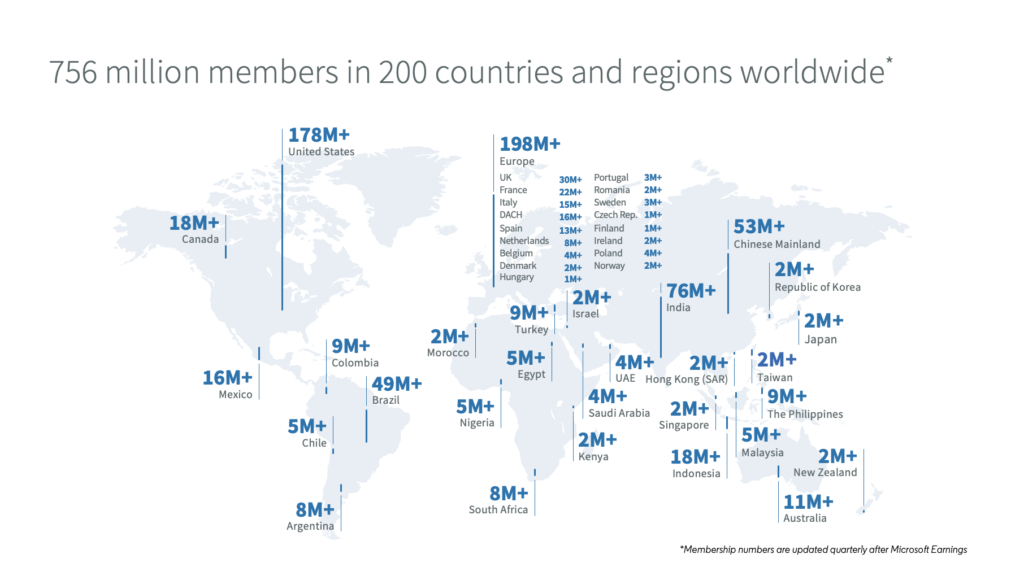
As the social media platform for professionals, this is a goldmine for finding and connecting with SMEs in your niche.
Let me walk you through a step-by-step process for doing that.
Let’s say you want to write about “project management”, and want to feature insights from niche experts in your article.
Here’s exactly how to find them on LinkedIn.
Step 1: Enter the main topic you want to find experts for “project management” on the LinkedIn search bar:

Step 2: Filter by posts in the new window that pops up:

Step 3: When you click on posts, you’ll be redirected to posts on LinkedIn which are related to project management.
Here, you can filter by “Date Posted”, “Author Industry”, “Sort by” “Posted by” etc.

Step 4: To get insights from people who have written about the topic recently, change the Date posted to 24 hours. Then, click on show results.

Step 5: Scroll through the posts as shown below.
Afterward, click on any one that catches your attention.
Here is an example:

By following this simple process, we’re able to identify an SME with over 20 years of experience in project management.
Step 6: Check out their profile, connect with them, and take it up from there.
You can follow the steps above for any topic you’re writing about.
The major advantage of using LinkedIn to find SMEs is that you can easily connect with professionals from different parts of the world.
The downside is that some professionals don’t want to connect with people they don’t know personally.
2. Twitter
With over 206 million daily active users, Twitter is another platform you should leverage to find SMEs in your niche.

The reason is simple…
Most people use Twitter every single day to get access to information faster. Also, they use it to network and learn from people they look up to.
Twitter users use the platform to share their original thoughts and ideas. Hence, it’s a powerful way to find experts to include in your article.
Let me walk you through a step-by-step process for making this happen.
Say you want to write about “copywriting”, and want to feature insights from people who are experts on the topic.
Step 1: Enter the broad keyword you want to find experts for on your Twitter search bar.

Step 2: In the new window that opens, click on “Advanced search”

Step 3: You’ll be redirected to a new window that looks like the one below:
Step 4: In this new window, enter the exact phrase that matches the experts you’re looking for. In this case, it’s copywriting:
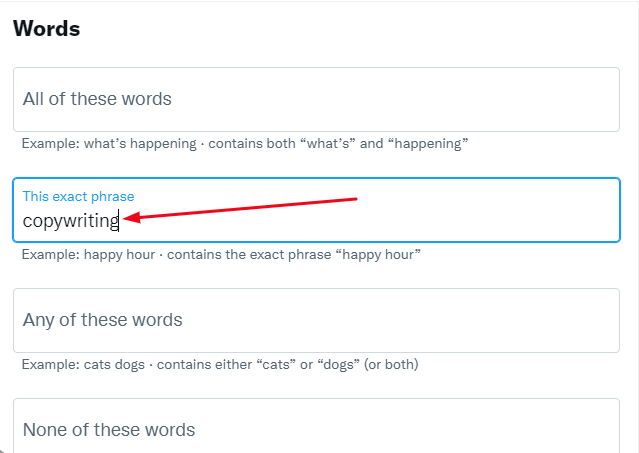
Step 5: Scroll down to choose the language your target expert tweets in. If your primary audience is English, choose “English”. Otherwise, choose other languages.

Step 6: Filter by the engagement on the tweets. Here, I recommend that you filter by the minimum replies on each tweet.
You can also filter by the number of likes and retweets that each tweet generated.
You can always change this afterward if you didn’t get the expected results.
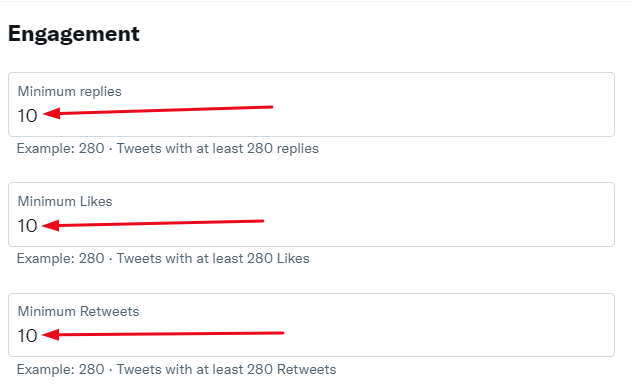
Step 7: Filter by the date the tweet was posted.
Say you want to reach out to those who have tweeted about copywriting in September 2021, you can filter by that only.
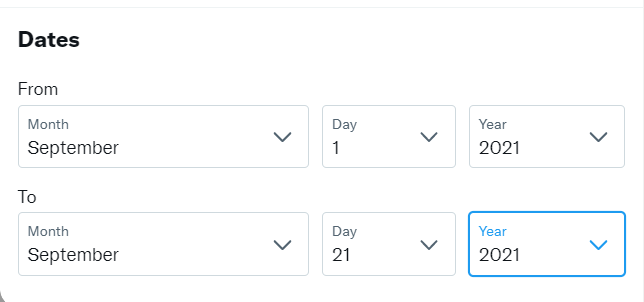
Step 8: After you’ve entered the necessary details, click on the “search” button.

Step 9: Once done, the results will pop up. And it looks like this:
By following this simple process, I found experts who are actively tweeting about copywriting such as:
- Jeremy Moser
- Blake Emal
- Zain Khan
- Aaron Orendorff
- Dave Harland
- Writing to Riches
- Sales Maverick
Step 10: Follow the experts you want to feature in your next article and send them a DM.
You can use the steps above to find experts in other niches on Twitter, aside from copywriting.
It’s relatively easy to connect with experts on Twitter. The downside is that some of them, especially those who have huge followership, might not respond to your emails.
3. Help a Reporter Out (HARO)
HARO has over 800,000 subject matter experts (SMEs) who are ready to contribute to your content pieces.
On the platform, you can register as a journalist or a source.
A journalist is someone looking for people to contribute quotes and insights to their content pieces.
A source is someone (aka expert), who wants to share insights with a journalist or publication.
If you’ve never used HARO to source for quotes to include in your article, here’s a step-by-step process on how to do that:
Step 1: Familiarize yourself with the rules for journalists on the platform. You do this by clicking on the “I’m a Journalist” button from the home page.

Step 2: Clicking on that button, will redirect you to this page with all the relevant rules for journalists on HARO.

Step 3: If you’re an online publication or business website, here are some things you should keep in mind:

As you can see, these are the conditions your website must meet before seeking expert sources on HARO:
- Must be launched at least one month before sending out the HARO query
- Must have an Alexa rank of 1 million or less
- Should not be a subscription-based outlet.
Step 4: If you meet these criteria, you can go ahead to submit a query.

Step 5: HARO editors will review your query and approve it for contributions if it meets the editorial requirement.
Step 6: Sit back and watch as the insights from experts roll in.
The advantage of using HARO is that you have access to hundreds of thousands of contributors and experts who want to share their thoughts with you. That said, it might be difficult to go through all the responses and choose the ones that are a good fit for you.
4. Help a B2B Writer
Help a B2B Writer is just like HARO. The only difference is that this is for B2B only.
On this platform, you can register as a source (expert), or submit a request to get insights and contributions from other experts.
Right now, there are about 20 niches with experts ready to contribute to your content pieces on Help a B2B Writer.

On this platform, the process for finding experts is pretty much straightforward. All you need to do is click on “Submit a Request” from the homepage.
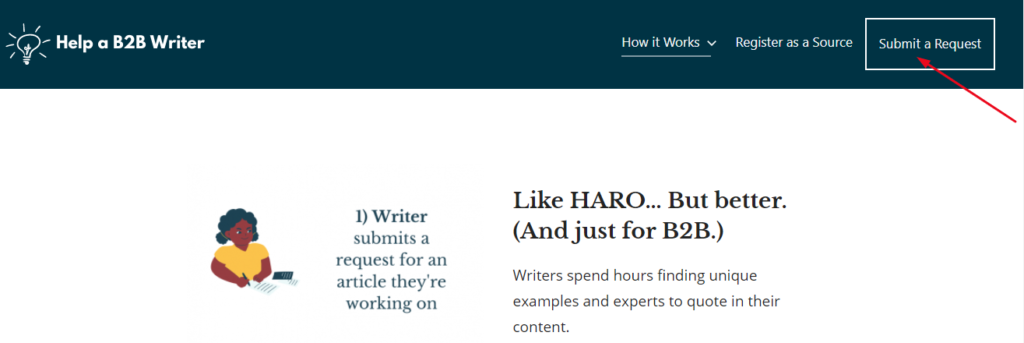
Once you click on that button, you’ll be redirected to an Airtable form that looks like this.
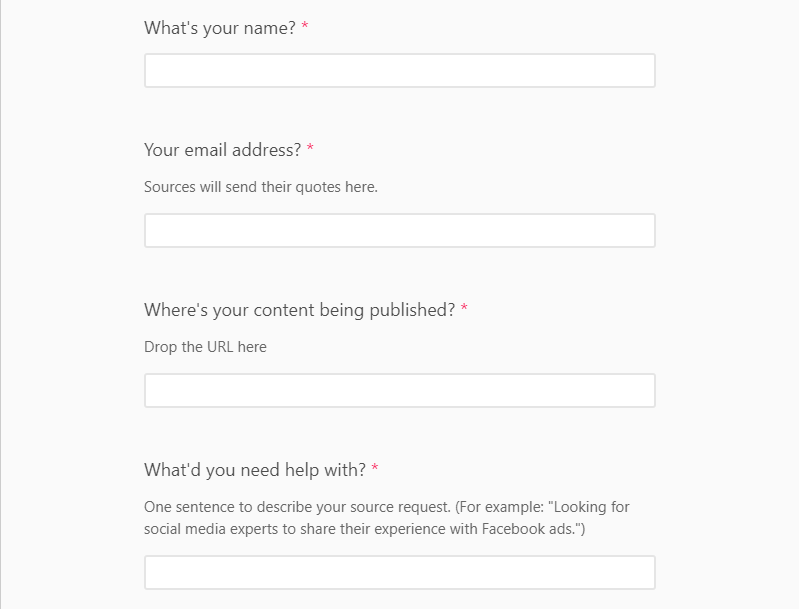
If your pitch is approved, an email will be sent to relevant niche experts to share insights with you.
Here’s one I received recently as an expert in the SaaS industry.

There you have it…
4 platforms you can use right now to find relevant SMEs in your niche.
Aside from these, you can use a tool like Sparktoro to find Subject Matter Experts (SMEs) in your niche.
Also, you can leverage Facebook groups and Slack communities where your target experts hang out, as well for this purpose.
How to use Subject Matter Experts (SMEs) For Content Marketing Success
Here is a fact…
There’s a limit to the number of content writers and agencies out there, who have the subject-matter expertise to write about every topic out there.
And even if they can, it might take time before they create a high-quality piece of content.
Say you run an email marketing software and want to write about “how to improve email open rates”.
You can reach out to email marketing experts to contribute their best tips on improving email open rates.
And guess what?
You’d have tons of tips on improving email open rates that you can include in your content.
That’s just one out of different ways to use SMEs in content marketing.
If you’ve followed the steps I outlined before, you’d most likely have found experts who want to contribute to your content.
How exactly can you maximize that?
Let me walk you through 4 things you should absolutely be doing, to get the best out of this strategy.
1. Make it easy for them to contribute
If you’re engaging SMEs to create your content pieces, make sure you’re specific with the question(s) you ask.
The reason is simple…
When you ask a specific question, you’re more likely to get in-depth insight and contribution.
However, if your question is generic, chances are that you’d get a generic response that might not be what you’re looking for.
The more specific your question is, the better.
2. Show them what is in it for them
Truth is…
If you ask an SME to contribute to your content piece, you’re taking out of their time, which they could spend on something else.
So, if you can prove to them that it’s worth it or can benefit them in any way, then you’ll most likely be successful with your pitches.
Take for instance…
If your website has a high domain authority, promising a high-quality backlink to the expert’s website or article is a win-win for both parties.
Alternatively, if there’s anything else you can help them with, that would be valuable to them, you can do that as well.
3. Establish ongoing rapport and relationship with them
An SME today won’t stop to be one tomorrow.
Hence, it’s important you establish an ongoing rapport and relationship with any SME that you work with when creating any piece of content.
Here is why…
If you have a solid relationship with someone, they’d be happy to contribute to any piece of content that you create on your website in the future.
When you have an ongoing rapport with an expert, they could even introduce you to other experts in their niche that you may not have access to.
4. Ask them to share with their audience
Aside from getting actionable insights and quotes from experts in your niche, collaborating with them is a great way to reach new people in your industry.
After the article goes live, most of these experts will most likely share your content on their social media platforms and link to you.
That way, you can leverage the audiences of these experts to reach more people.
In some cases, you’d have to ask them to help in sharing this piece of content with their audience.
How Databox Leverages Experts to Create Content That Adds Value, Generates Social Shares, and Earn Backlinks
Databox is an analytics platform that helps business owners measure and track KPIs that matter to their business.
This is a useful tool for marketing teams that want to pull data from different sources, to know exactly what works and what doesn’t.
As you can see, Databox’s target audience is mainly marketers. So, they need to create content that’s high-quality and helps their users and audience to solve specific problems.
Guess what they do?
They leverage the expertise of marketers, who make up their audience to generate content.
If you check their blog, here’s what you’ll most likely see:
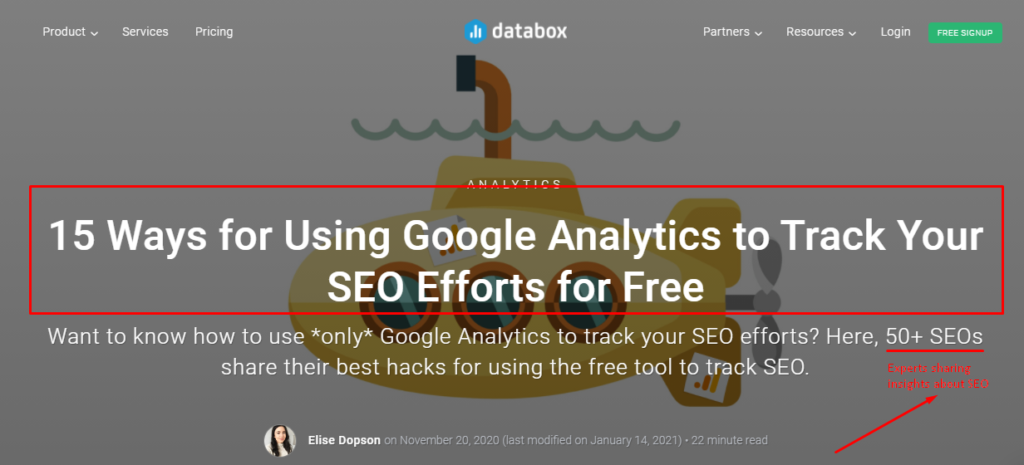


From each of these examples above, you can notice that most of their articles are contributions from experts in the topic they’re writing about.
And when you check each of these content pieces, you’ll notice that this isn’t just a typical round-up post.
Rather, they used the insights provided by the experts to create a unique angle and also reference them in the article.
Here are some examples:

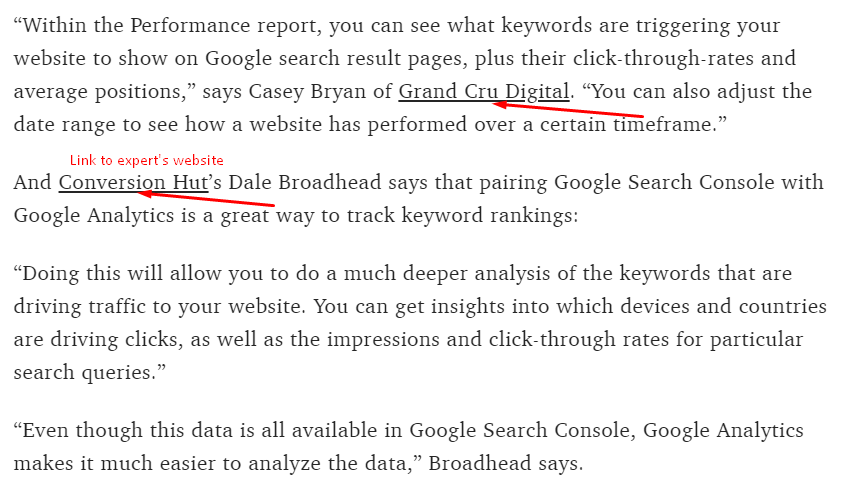

Now you might be wondering how Databox gets these marketing experts to contribute to their articles every week.
One thing that works really well for them is the power of collaboration and partnership with other website owners.
Here’s an example:
Some months ago, I wrote a post on my blog about conversational marketing and featured Databox as a case study. So, I reached out to their team to inform them about it.
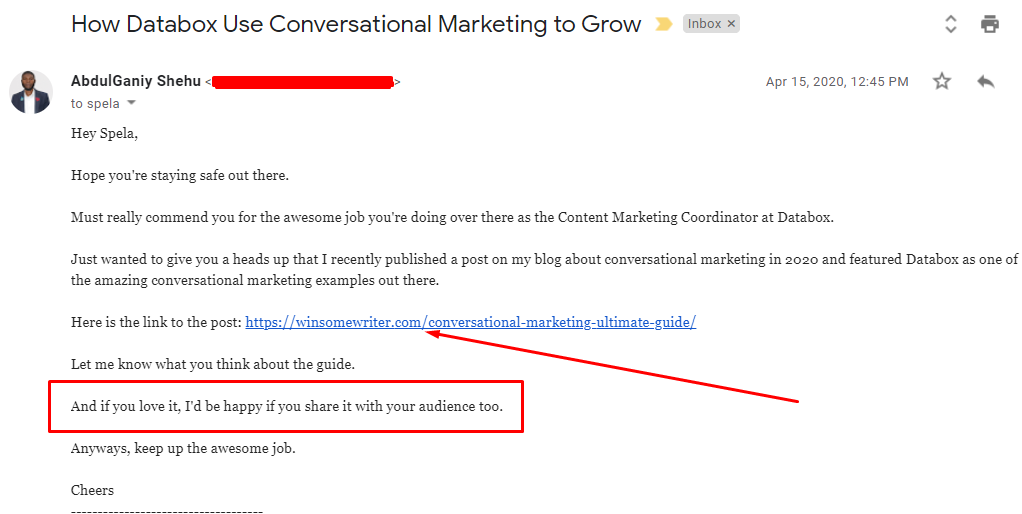
And guess what?
They actually shared the post with their audience and notified me about it.
Not only that, but they also reached out to offer me the opportunity to contribute to their future content as an expert.

After I entered my details in the form, I get an email from them every week inviting me to contribute to their upcoming pieces.
This is a recent one I got and contributed to:
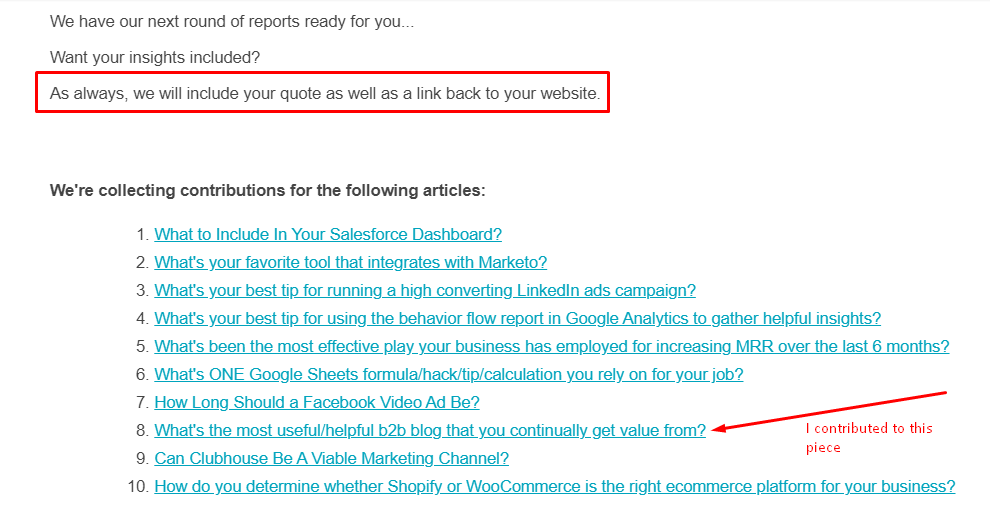
And as you can see, my contribution was added to the piece, with a link back to my website as promised.

If you think the Databox team actually stops there, you’re obviously mistaken. They send an email to notify contributors about their upcoming features in their content.
Here’s one I got:

You’ll notice that this email does four (4) things:
- Notifying me about the contribution with a link to it
- Telling me about the promotion they did for the post on LinkedIn
- Urging me to upvote the article on Growth Hackers
- Requesting that I contribute to more articles.
On LinkedIn, here’s what the promotion looks like:
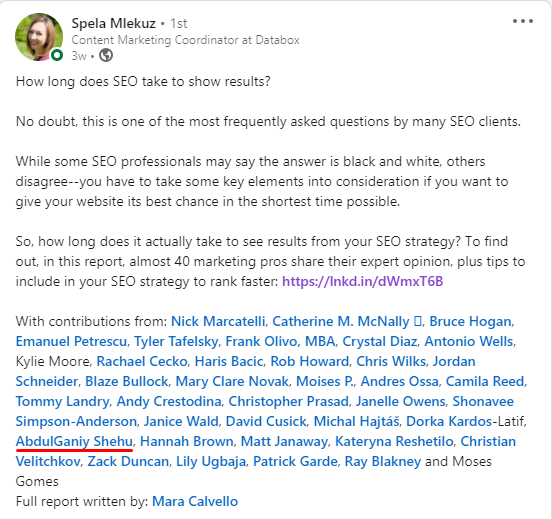
As you can see, they mentioned me and other experts who were featured in the article.
And in return, most of the contributors also share the piece with their audience.
Here’s exactly how I promoted this piece I contributed for them:
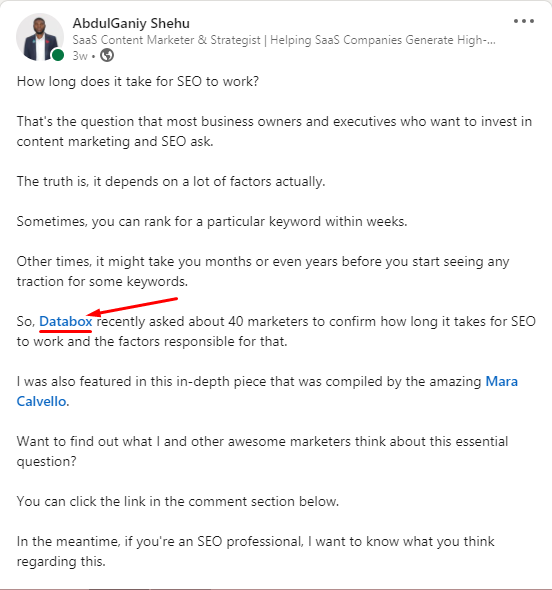
I shared this piece with my LinkedIn audience.
Here’s another contributor also promoting them on LinkedIn:

By leveraging the expertise of others in their content, Databox has built an SEO moat that’s hard to beat.
According to their CEO, they’ve been able to build a scalable content machine, and 3X their content output, with just a marketing team of about 7.
Final Thoughts: Create Actionable and Valuable Content For Your Readers By Leveraging SMEs
One of the most effective ways to create valuable and actionable content for your readers is to include insights and quotes from Subject Matter Experts (SMEs) in your niche.
That way, you won’t just be writing from one point of view (POV), but also including what others think in your content.
When you do this, you’d find it much easier to establish trust with your target audience faster.
This is because they’ll come to see you as someone who genuinely cares about them and wants to provide them with the right education to grow their business.
As a SaaS content marketing agency, this is one of the content strategies we recommend and implement for our clients.
If you’d like us to help with your SaaS content marketing strategy, click on this link to get a free content analysis from our lead content strategist.
You can as well join our newsletter, SaaS Growth Bites, below to receive exclusive insights and tips every Thursday, on the best way to grow a SaaS business using content marketing.
